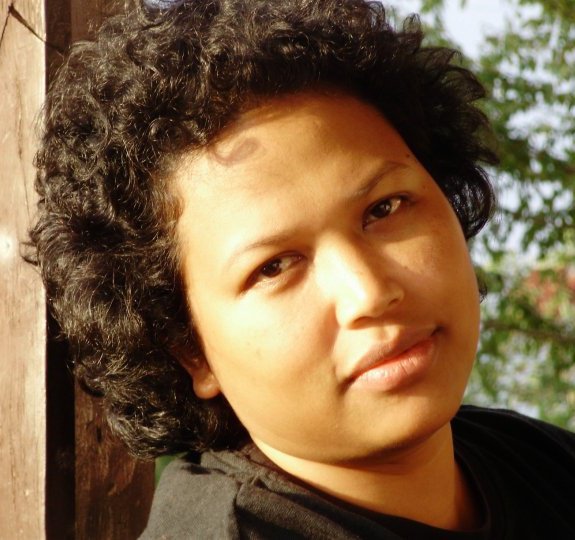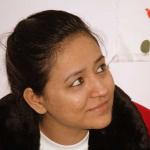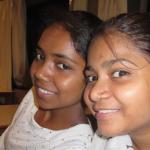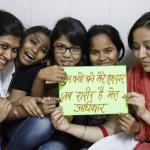The story of FAT’s beginning
An engineer by education and a curious, inquisitive individual by inclination, Gayatri’s journey began with repairing and fixing technical products. Employed in a feminist, human rights organization in New Delhi, Gayatri worked as a technical support person. Before working in this organization, she had never even heard the word feminist or feminism. Raised in small towns across North East India in a conservative, middle class family, her upbringing and education was quite distant from any theoretical, literary or activist engagement with women’s rights. While she did grow up as a rebel in her own way, looking at things from a gendered and critical eye happened much later.
For someone who had no background on feminism and women’s rights, working with her previous organization introduced Gayatri to several never heard before concepts and theories. She realized that there are organizations and people working towards achieving women’s rights and human rights. That this wasn’t something you get on a platter but something that a patriarchal society makes you fight for. This realization was enough for her to go beyond her everyday work of fixing and repairing technology to sneak in and hear conversations, discussions and debates around feminism.
Soon, Gayatri began linking her new found knowledge and understanding of feminism to the field she was most aware of and comfortable with—technology. She began to see linkages of the larger politics of gender with the constant conflicts and rebellious fits she had when she was in her engineering college. But every time she put the two together, she did not garner a very encouraging response. She was told that technology and women don’t match. That women can’t do technology and that she was just an exception. But where was this unabashed assumption coming from? With the help and support from some of her colleagues, Gayatri managed to get a little space to discuss technology with grassroots women’s rights leaders which further affirmed her need to raise some critical questions, highlight the silence on women and technology from the larger feminist movement in India and spark an interest among her other colleagues on gender and technology and how the two intersect.
While Gayatri wanted to explore this further, it was difficult for her to articulate what exactly was bothering her and what exactly was the solution to the issues and loopholes she had identified. Her first choice was to look for a job in an organization that works on this. But researching on the same made her realize there was none. While there were organizations and initiatives towards ICT for Development or Change, there was simply no organization in India that was working closely on looking at intersection of technology and women’s rights or to promote women’s participation in technology. This alarmed her! In addition, the search for a job introduced Gayatri to the variety of discourses taking place on technology and women across the globe. This helped her identify the issues that were bothering her, look at the Indian context and see the gaps and evaluate what she felt needed to be done. The central question was whether to keep looking for an organization that works on all this or simply start one. Gayatri chose to do the latter.
In August 2007, Gayatri left her previous organization to start an organization of her own. At that time, she was 28 and battling marital troubles in her personal life. Both personal and financial struggles were huge deterrents but this did not stop her from undertaking the Herculean task of setting up something that could have a deep impact on creating a necessary social change. As she began to work towards the initiation process, the term “FAT” hit her mind and the idea of having a “Feminist Approach to Technology” came to the forefront. Thus began the inception of FAT as an organization, as a name and as an approach.
While Gayatri was passionate about her idea, she had no clue about the procedural requirements of setting up a not-for-profit organization. But she was clear about the fact that she wanted to work with women who do not have access to technology. Thus, after forming FAT, Gayatri’s first step was to meet experienced and prominent feminist activists, development leaders and people connected to the science and technology fields to share their ideas and concerns, get their feedback and brainstorm on workable ideas together. However, she faced prejudice on the grounds of her being someone who doesn’t come from a theoretical understanding of women’s rights, besides being “too young” to talk about such big changes. But the pervasive and penetrating reach of technology was too omnipotent to ignore, especially in an age when technology was increasingly bearing the brunt of (and in many ways actually) being the bad guy.
Gayatri realized and understood the urgent need to look at technology and its reach in a critical manner. One look at technology from a gendered eye revealed that even in the distinction between men’s work and women’s work, there is a technical and technological difference. She also realized, after a careful research and analysis, that a lot has been happening in the US in STEM (Science Technology Engineering Mathematics) fields and education but nothing concrete in the Indian and South Asian context had emerged so far. This made her think loudly about the questions we need to ask around technology. What technology is the State giving us? What technologies do we use every day? Are they shaped by our gender identities? Who is benefitting from this? How does technology and development co-exist? Or can it even co-exist?
It was clear that there was a need for alternative technology and an alternative way of looking at technology. There was also a need to look at STEM and technology with a feminist perspective so that all voices get a space to be heard. In this regard, Gayatri began work from her own end by creating FAT’s website, adding elements like organization’s vision, mission and beliefs, which echoed her thoughts and what she believed in as far as creating a social change through an organizational intervention was concerned.
Established as a society in 2008, the first three years for FAT were those of intense struggle. With no concrete financial support or possibility of getting foreign grants owing to the absence of an FCRA certificate, FAT was running solely on individual donations and volunteer support. The initial activities were limited to workshops conducted in free spaces provided by other organizations and sometimes at Gayatri’s own house with girls from around her own neighbourhood. It took time for FAT to widen its outreach and reach out to many more adolescent girls from socially and economically disadvantaged families. As the number of computers started increasing owing to individual donations, the number of girls interested to know more about it also began to increase with FAT and Gayatri gradually becoming a known name and face among the community.
In 2010, FAT received its first official grant from The Global Fund for Women and MamaCash. By then, the organization had somewhat established its credibility and importance among the community members and more girls had started showing interest in associating with FAT. A Tech Center for girls was started in 2010 with immense support from volunteers. FAT had a space of its own now buzzing with activities, fun and laughter. From here on, the team only grew, and so did the scope of work and the volume of stories that made each member laugh, cry and feel proud.
In 2013, Gayatri decided to make more space for the next generation of leaders to take up the responsibility and concentrate on the organization’s growth and development. This was also the year when FAT started to receive acclaim for the success of its Tech Center and also started venturing into new areas of work, like working within schools to look at STEM education from gender perspective. It was decided to mould FAT into a young women’s leadership model where each team member gets space to head their respective project/unit with mentorship and handholding.
FAT currently runs three distinct programmes—Tech Center, School Intervention and Advocacy Initiatives. The Tech Center program has also been replicated in Vadodara, Gujarat, while the possibilities and challenges of replicating it in Jharkhand, Bihar and Rajasthan are also being considered. Today, FAT is well-known among feminist circles, development sector professionals and even globally, with its consistent participation and increased visibility. FAT’s presence online and offline has increased, FAT’s team has expanded considerably with six members employed full-time handling several programmes assisting Gayatri in running the organization in a smooth and efficient manner. FAT is also a crucial campaign partner with The Global Fund for Women’s IGNITE project that aims to feature stories of women and girls who are leading and innovating in science and technology.
FAT has also been proud of bringing forward community leaders from amongst its own Tech Center alumni. Some have been employed with the organization as interns, some are engaged in fellowships working on independent projects of their own, some have become exclusive photographers and filmmakers for FAT assisting in highlighting organizational work by incorporating their technical skills and knowledge. But most importantly, they have all grown as individuals and emerged as independent leaders with a strong feminist consciousness. And this has been FAT’s greatest and most satisfying success. Gayatri began this journey with the idea of helping women create their own space. And with its various programmatic interventions, FAT has been striving to do so.
Written by Deepa Ranganathan




